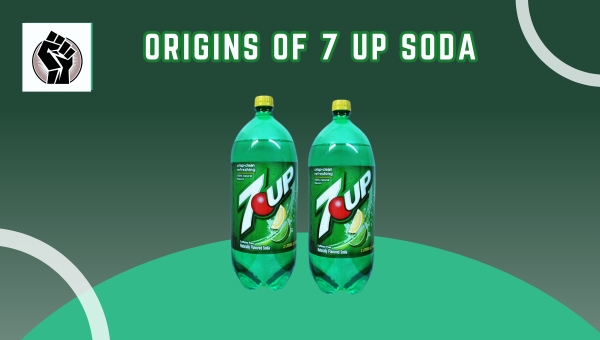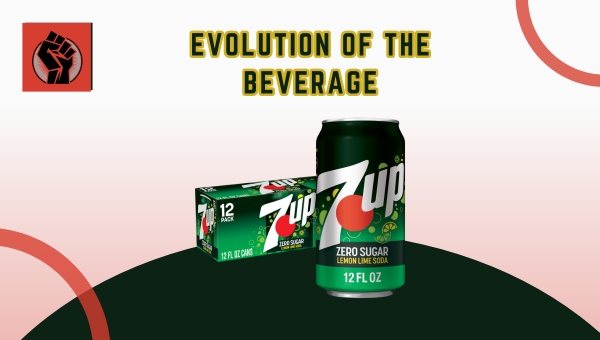It’s a hot summer day, and you’re reaching for a can of 7 Up soda, the crisp, lemon-lime flavor tingling your taste buds. This iconic beverage, with its fizzy charm, has been a staple in soft drink culture for decades. But have you ever wondered about the History of 7 Up soda?
From its intriguing beginnings in the late 1920s to its evolution over the years, 7 Up has a story as refreshing as its taste. Let’s take a journey through time to explore the origins, transformations, and impact of this beloved drink that has quenched thirst worldwide.
Origins of 7 Up Soda
The history of 7 Up Soda is a captivating tale that began in the late 1920s. This lemon-lime beverage has undergone significant changes since its inception. Let’s explore the origins of this iconic drink, delving into the contributions of its inventor and the original choices made in its formulation and naming.

Inventor and Initial Development
7 Up soda was created by Charles Leiper Grigg in 1929. Grigg, who had a background in the soft drink industry, was determined to craft a distinctive lemon-lime soft drink.
His expertise allowed him to experiment with various flavors, leading to the creation of a refreshing beverage that quickly gained popularity. Grigg’s innovative approach and strategic marketing were instrumental in laying the groundwork for 7 Up’s early success.
Original Formulation and Naming
Initially, 7 Up was known by the lengthy name “Bib-Label Lithiated Lemon-Lime Soda.” It contained an interesting ingredient, lithium citrate, which was known for its mood-stabilizing properties.
However, this ingredient was removed in 1948. The name “7 Up” has several theories surrounding its origin; one suggests it refers to the seven ingredients in the original formula, while another links it to the atomic mass of lithium. This catchy and concise name helped the drink stand out in a competitive market.
Evolution of the Beverage
As time has passed, 7 Up Soda has transformed to align with changing consumer tastes and industry standards. This evolution encompasses modifications in ingredients and strategic branding efforts that have helped 7 Up maintain its appeal in a competitive market.

Ingredient Changes Over Time
Throughout its history, 7 Up has experienced various ingredient changes. Initially, the soda contained lithium citrate, which was removed in 1948. Over the years, the formula has been adjusted to meet consumer demands for healthier options.
Recent changes have focused on eliminating artificial additives and refining the sweeteners used. These adjustments reflect broader trends in the beverage industry towards cleaner, more natural ingredients.
Branding and Marketing Strategies
Branding and marketing have played a crucial role in shaping the image of 7 Up.
Here are some pivotal strategies that have defined its presence:
- “The UnCola” Campaign: This campaign positioned 7 Up as a refreshing alternative to traditional cola drinks.
- Catchy Slogans: Memorable slogans like “Take the ouch out of grouch” have highlighted the uplifting nature of 7 Up.
- Visual Identity Evolution: Over the years, the logo and packaging have been updated to mirror changing consumer preferences and values.
These strategies have been key in ensuring that 7 Up remains a recognizable and favored choice among consumers worldwide.
Also Read: Mountain Dew History: The Rise of a Beverage Legend
7 Up in Popular Culture
The journey of 7 Up Soda into popular culture has been marked by clever marketing and celebrity collaborations. Its presence in the market is more than a refreshing drink; it’s a part of the cultural tapestry. Let’s explore the vibrant advertising campaigns and the sparkle of celebrity endorsements that have defined 7 Up’s cultural footprint.
Advertising Campaigns
7 Up has captivated audiences with memorable advertising campaigns. These campaigns have played a crucial role in shaping the brand’s identity:
- “Nothing Does It Like 7UP”: This slogan captured the drink’s refreshing essence, making it a household phrase.
- Psychedelic Ads: In the late 1960s, vibrant and colorful ads helped rejuvenate the brand’s image, appealing to younger demographics.
- “The UnCola”: This campaign emphasized 7 Up as a unique alternative to traditional cola drinks, enhancing its appeal.
Celebrity Endorsements
Celebrity endorsements have been a significant part of 7 Up’s marketing strategy, bringing the brand into the spotlight:
- Notable Figures: Celebrities from various fields have endorsed 7 Up, boosting its visibility and appeal among fans.
- Trendy Image: These endorsements have helped maintain 7 Up’s trendy image, making it a preferred choice among younger consumers.
By leveraging creative marketing and the allure of celebrity endorsements, 7 Up has secured its place in popular culture, ensuring its legacy continues to thrive.
Impact on the Soft Drink Industry
7 Up Soda has left a significant imprint on the soft drink industry, not just as a product but as a trendsetter. Its journey through the years exhibits a dynamic interplay with other brands and a notable influence on market trends.

Let’s explore how 7 Up stands out in this competitive arena and shapes the beverage landscape.
Competition with Other Brands
In the bustling world of soft drinks, where numerous brands vie for attention, 7 Up carves out its space with distinct strategies:
- Unique Flavor Profile: By offering a refreshing lemon-lime taste, 7 Up positions itself as a choice apart from cola-centric rivals.
- Brand Recognition: With memorable slogans and logos, 7 Up maintains a strong presence in consumers’ minds.
- Diverse Variations: By introducing different flavors and options, 7 Up adapts to changing consumer preferences and stays relevant.
Influence on Beverage Trends
7 Up has not only kept pace with the changing industry but also set the stage for new trends:
- Natural Ingredients: By focusing on natural components, 7 Up reflects and contributes to the growing demand for healthier beverage options.
- Innovative Marketing: With creative advertising and branding, 7 Up often leads the way in setting new standards for how beverages are marketed.
- Consumer Engagement: Through engaging campaigns and promotions, 7 Up connects with its audience, influencing how brands interact with consumers.
Also Read: Mellow Yellow Soda – Discover Its Refreshing Taste
Global Expansion of 7 Up
7 Up soda has spread its refreshing taste beyond its origins, reaching diverse corners of the globe. Its journey of expansion showcases how a beloved beverage can adapt and thrive in various international landscapes. Let’s dive into its impressive global presence and see how it has tailored its offerings to different regions.
International Markets
7 Up’s entry into international markets is a testament to its universal appeal. Here’s a look at how this iconic soda has made its mark globally:
- Local Partnerships: Collaborating with beverage companies around the world has been key to 7 Up’s international success.
- Cultural Adaptation: Tailoring marketing strategies to resonate with local consumers has helped establish a strong presence.
- Widespread Distribution: Ensuring availability across continents has made 7 Up a household name worldwide.
Regional Variations
Exploring 7 Up’s regional variations reveals a fascinating approach to meeting local tastes and preferences.
Here’s how 7 Up has customized its offerings:
- Flavor Variants: Some regions enjoy unique flavors that cater to local palates, offering a twist on the classic lemon-lime.
- Packaging Designs: The packaging often reflects local culture and aesthetics, enhancing its appeal and connection with consumers.
- Ingredient Adjustments: In certain areas, ingredient modifications are made to align with regional dietary preferences and regulations.
FAQs
Is 7 Up a Pepsi product?
7 Up is indeed associated with Pepsi in several regions. While PepsiCo handles the distribution and bottling of 7 Up in certain areas, it is owned by Keurig Dr Pepper in the United States.
When was 7 up invented?
7 Up was invented in 1929. It was created by Charles Leiper Grigg, who introduced this lemon-lime flavored soda to the market, quickly gaining popularity.
How did 7up get its name?
The name “7 Up” has several theories behind it. Some suggest it refers to the seven ingredients in the original formula, while others think it might relate to the drink’s uplifting qualities.
Conclusion
The journey of 7 Up Soda from its inception to its current status as a global beverage is a fascinating example of innovation and adaptation. From its creation by Charles Leiper Grigg to its evolution in formulation and marketing, 7 Up has consistently met the changing preferences of consumers.
Its impact on the soft drink industry and its presence in popular culture showcase its significance. As 7 Up continues to expand globally, it remains a testament to the power of branding and consumer connection.
If you enjoyed learning about 7 Up, explore more captivating stories about your favorite beverages on our blog!





